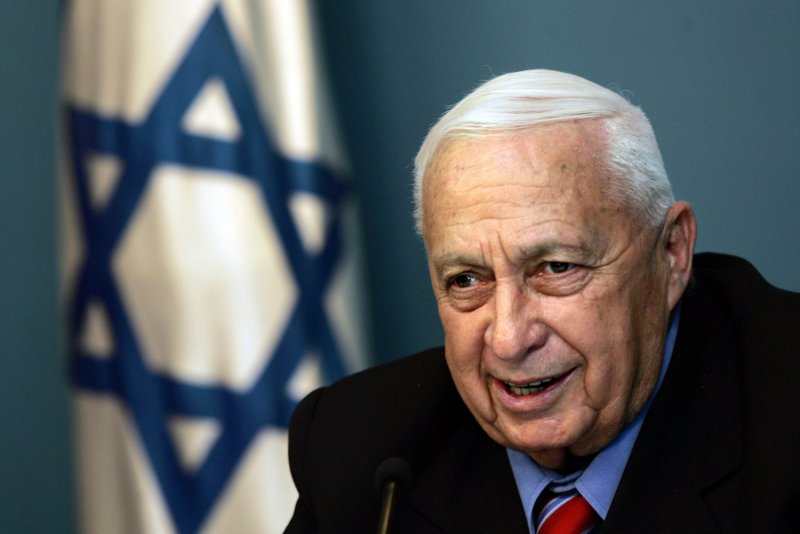Former Israeli Prime Minister Ariel Sharon died Saturday, eight years after he suffered a massive stroke on January 4, 2005. He is shown during a press conference at his office in Jerusalem, on November 21, 2005. (UPI Photo/Emilio Morenatti/POOL/Files) |
License Photo
JERUSALEM, Jan. 11 (UPI) -- Condolences poured in from across the world Saturday at the news former Israeli Prime Minister Ariel Sharon had died at age 85 after eight years in a coma.
Sharon suffered a massive stroke while campaigning for re-election in 2006 at the height of his political power. He had remained incapacitated since. Doctors at the Tel Aviv hospital where he died said Sharon's condition began to worsen Jan. 1, the Jerusalem Post reported.
Israeli Prime Minister Binyamin Netanyahu expressed his "deep sorrow" and promised Sharon's memory would live on in the Jewish state forever.
Calling him "my dear friend," Israeli President Shimon Peres, a frequent political rival of Sharon's, described him as "a brave soldier and a daring leader who loved his nation and his nation loved him," ABC News reported.
U.S. President Barack Obama offered condolences, saying Sharon was "a leader who dedicated his life to the state of Israel."
"We reaffirm our unshakable commitment to Israel's security and our appreciation for the enduring friendship between our two countries and our two peoples," Obama said. "We continue to strive for lasting peace and security for the people of Israel, including through our commitment to the goal of two states living side-by-side in peace and security. As Israel says goodbye to Prime Minister Sharon, we join with the Israeli people in honoring his commitment to his country."
United Nations Secretary General Ban Ki-moon called Sharon "a hero to his people, first as a soldier and then a statesman."
French President Francois Hollande and British Prime Minister David Cameron both also honored Sharon's commitment to peace and stability in the region, Voice of America said.
Former U.S. President Bill Clinton and his wife, former Secretary of State Hillary Clinton, issued a joint statement, saying they fondly remember arguing with the feisty Israeli leader and honored his commitment to peace in the region, including his highly controversial order in 2005 for Israelis to abandon settlements encroaching on the Palestinian territories as a precursor to peace negotiations.
Sharon's decades on the Israeli political landscape were marked by both controversy and victory, CNN said. He was defense minister when Israel invaded Lebanon in 1982 and later resigned after a commission found him indirectly responsible for the deaths of hundreds of Palestinians killed by Lebanese Christian fighters in refugee camps under Israeli control.
There, news of his death was greeted with a mix of harsh words and a call to arms.
Munir Maqdah, the Fatah military commander at the Ain al-Hilweh Ain refugee camp in southern Lebanon, said Sharon was "the butcher that killed Palestinians in the occupied lands and in Lebanon."
The Beruit Daily Star said Palestinians living in the camp shouted, "We wish he had fallen in battle" as they played revolutionary songs to greet the news.
Sharon was also credited as an instrumental military leader during two of Israel's most important military victories, the 1967 Six Day War and the 1973 Yom Kippur War. Sharon also helped found two political parties that still have major roles in Israeli politics.
Sharon's body will lie in state in the Israeli parliament before his state funeral, which is being organized by the prime minister's office. He will be buried on his ranch in the Negev next to his wife, who died in 2000.















